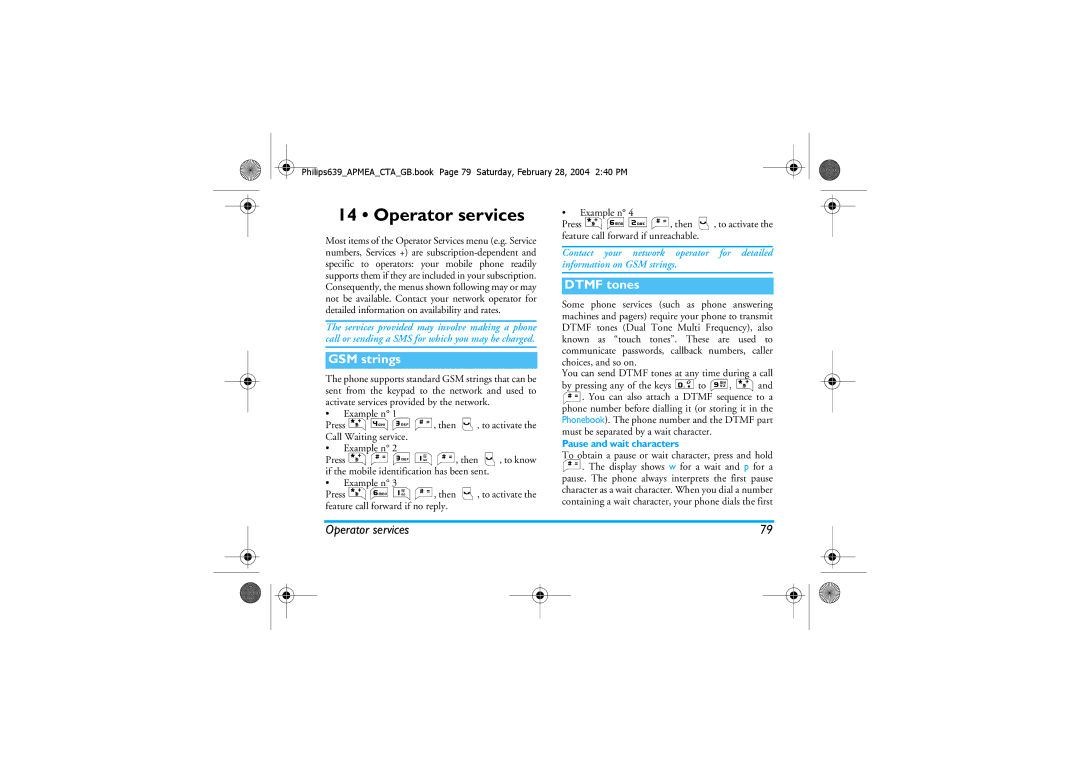Discover your phone
How to
Idle mode
Events
Carousel
Table of contents
Create your own style and mix
Troubleshooting
Getting started
Insert the SIM card
For complete date and time options, see
Switch on the phone
Set date and time
First call
Charge the battery
Copy of the SIM phonebook
Getting started
Main features
Access and consult the phonebook
Make a call
Answer and end a call
Activate the silence mode
Mirror FX
Change the ringer
Activate the vibra alert
Adjust the earpiece volume
Crazy clock
Read your mobile phone number
Mute the microphone
Other features during a call
Clear the call list
Clear the SMS list
Clear the phonebook
Messages p46
Settings p34
Menu tree
Settings / Open mailbox / Send mail
Create an MMS / Receive an MMS / Manage folders / Settings
Multimedia p62
Games and appli. p64
Call list / Reset
Operator services p79
Call information p69
GSM counters / Gprs counters
Multimedia Messaging
Create an MMS
Select the addressees
Design your message
Delete slide To delete the selected
Access the options
Press ,to send your message, or move to access the options
Save as To save your message as a template
Messages saved as drafts must feature a subject
Send your Message
Get and store attachments
Receive an MMS
Download and play an MMS
You will never be able to do so
Manage folders
Notifications Are
Settings
Network account
Bearer
MMS Centre
Gateway port
Application settings
Gateway address
Slide duration
Auto save
Validity period
Press to clear all text
Basic text input
SIM card phonebook
Card, even though it features less fields of information
Phonebook
Phone’s phonebook
Add names in the phonebook
SIM card
Phone
Fotocall see and hear who’s calling
Add a record in the phone’s phonebook
Own numbers
Add a name field
Edit and manage names
Add a field
Change a field content
Make default
Change a field type
Delete a field
Make calls
Emergency number
Other number
Enter a number
Use Flash dial
Use Voice dial
Settings
Sounds
Display
Sounds Alerts
Vibra alert
Screen saver
Hotkeys
Animation
Backlight
Wallpaper
Activ. Headset Meeting
Subscription dependent
Displays the Total cost of outgoing calls
Voice command
Voice dial
Call barring
Security
Public names
Network
Change codes
PIN protection
Gprs attach
Preferred list
Access settings
Register again
Gprs settings
Time and date
Clock display
Set date
Language
Profiles
Time zone
Set time
High
Profiles
Messages
Send a SMS
To a name in the list
To any other name
Messages
Together with an attachment
SMS settings
Saved Messages
Delete all SMS
SMS centre
This feature is subscription dependent
Mail
SMS Archive
Reply path
Settings
Network access
Account name
Mail server access
Settings and press
Write and send an e-mail
Advanced
Contact your provider for complete information
To one or several recipients
Receive and read e-mails
With a sound or a picture
Connect to the server
Press ,and select Messages E-mail, then E
Select a header, press ,, select Details and press
Download e-mails
Get and store attachments
To display these details
Add an e-mail address to the phonebook
Delete e-mails
Reply to an e-mail
Forward an e-mail
Broadcast message
Instant message
District codes
Reception
Mix music
Get started
Activate tracks
Press cto deactivate all Tracks at once
Record a mix
Change track melodies and instruments
Change the tempo
Start recording
From existing files
Create your own style and mix
Manage the recording
From scratch
Save your own styles
Receive a call
Multimedia
Picture album
Sound album
Display, see
Demo mode
Memory status
Press ,to launch the Demo movie
Once your sound is recorded. You can then
Alarm clock
Games and appli
Calculator
Organiser
Change an event
Modify an event
This menu only applies to Meeting and ToDo events
Change any information as needed and as described above
Deleting an event
Views of events
Starting
Zoo
Brick Game
4and To move the racket left or right
Call settings
Call information
Active flip
Call forward
Mailboxes
Auto redial
Any key answer
Call waiting
Reset
Then Reset. Press ,twice to reset
This menu gives you access to the options described below
Call counters
Gprs counters
Total duration
Last call information
Info at call end
Last mobile session
Last PC session
Internet services
WAP
Launch a WAP session
End a WAP session
Bookmarks
Enter address
Select Profile
Connection
Press and hold 0to enter a dot «.»
Security
Options
Push inbox
Rename Profile
Browser Options
Back
Forward
Refresh
Save as homepage
Operator services
GSM strings
Dtmf tones
Pause and wait characters
Make a second call
Answer a second call
You can activate the conference call by
Answer a third call
Conference call
Explicit call transfer
Taking pictures
Camera management
How to
Plugged, long press the m
General principles
Picture shots
Plug in the camera
With the self-timer
Take a picture
Review the pictures
With the mkey
Colour mode
Camera mode
Picture resolution
Make a call
Picture quality
Self-timer
See Self-timer
Troubleshooting
Temperature Does not
50C 113F
Page
Icons & symbols
Alarm clock activated
Precautions
Radio waves
Always switch off your phone
Users of pacemakers
Users of hearing aids
Performance improvement
Information displayed on the battery
Your phone is powered by a rechargeable battery
Do not use your phone while driving
Phone you are recommended to use
Battery
EN 60950 Norm
Environmental care
With general household waste Packaging
Philips authentic Accessories
Limited warranty
Except for the Express Warranties

